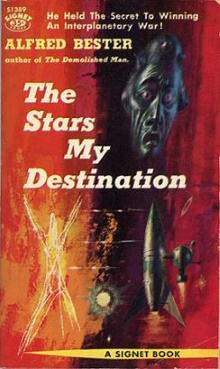Finally, I’m back to working through the list of the great science-fiction novels of all time and this must be one of the weirdest entries on the list. It was originally published in 1956 under the title of Tiger! Tiger!, named after William Blake’s poem. The newer title makes it feel more like science-fiction certainly but the original title really captures its spirit better: an unapologetic paean to the individual superman. As a tour de force of pure imagination the book is marvelous and no wonder it’s considered a classic of the genre. Still I must admit that the deliberately wild ride that is its plot and and the odiousness of its protagonist makes it a difficult novel for me to enjoy.
In a future setting where jaunting, personal teleportation psionics, is possible and a solar system where the Inner Planets are at war with the Outer Satellites, we are introduced to the character of Gully Foyle. Foyle is an uninteresting and uneducated crew member serving on the merchant starship Nomad. After a mishap, he is the sole survivor on board the ship’s wreck and is stuck in space for six months. One day he sees another starship, the Vorga, passing by and feels hope of being rescued. When the ship notices yet deliberately ignores him, he is transformed by intense rage and the drive for vengeance. He is inspired to rescue himself, jury-rigging risky repairs of the wreck to get it to move and crashes into the asteroid habitat of a strange cult. The cult tattoos a hideous mask of a tiger onto his face but he manages to escape to Earth. There he tries to find out more about the Vorga and is willing to do anything, break every law and disregard all morals to get what he wants. Unbeknownst to him, the authorities are also desperately searching for him and the Nomad was transporting a uniquely powerful form of explosive called PyrE and only he knows where the ship is.
I know that psionics used to be a big part of science-fiction but that was mostly before my time and I never liked this space magic stuff much. Psionics are central to this novel from the teleporting that most people are capable of from city to city, to the existence of telepaths and even the nature of PyrE. Bester is rather good at exploring the wider consequences of these powers being real. Most forms of transport for example are obsolete and secure places need to be kept out of sight so people can never learn that location. It even discusses how women have less freedom under the new regime and their virtues are constantly under threat by the ease of jaunting. There are many other fascinating details in the worldbuilding such as the fact that religious worship is banned and cellar Christians who worship in secret are taboo, the flamboyant way that the rich flaunt their self by deliberately using obsolete technology and disdaining jaunting, the prison that maintains security by keeping all prisoners in perpetual darkness and so on. There’s even a vivid description of synesthesia in the book, apparently one of the earliest uses of the condition in fiction.
This profusion of ideas doesn’t redeem in my mind what is a rather straightforward plot in service of an ideal that I find reprehensible. Foyle’s adventures consist of him engaging in an escalating series of crimes in his quest for revenge. The whole point of his character is that no atrocity is too far: mass murder, rape, torture, nothing is off the table. Foyle and everyone else in the novel call him a monster but as in Blake’s poem the theme is that there is something majestic and beautiful in such an unrestrained, ferocious creature. The novel is clear that Foyle was an unremarkable, boring and ordinary drone before the shock he experienced galvanized him and woke him up. Thereafter Foyle is ruthless, creative and proactive in overcoming obstacles and gathering resources. He educates himself, gains immense wealth, cybernetically implants himself into a supersoldier, uses hynotraining to gain skills needed for particular situations and even becomes probably the most powerful psionic. To me, it feels like the rise of a Nietzschean superman out of the ashes of mediocrity. What’s worse is that the novel tries to redeem and excuse his actions towards the end.
I’m aware of the irony in writing this post and I still have libertarian leanings myself. But this is just too monstrous for my tastes and relies on the tiresome trope of the mindless masses being useless crowd following conformists. I’m also irked by how the female characters in here are treated so in the end the story of this superman becomes another kind of male power fantasy. The originality of the ideas in it is indisputable and it’s a book that was far ahead of its time. But it’s not a book that I really enjoyed nor found admirable.
